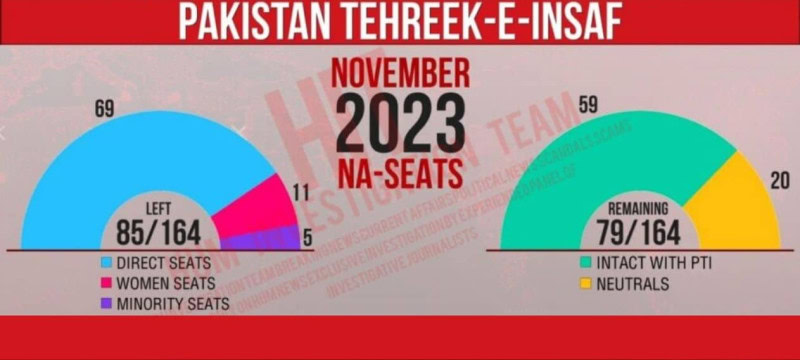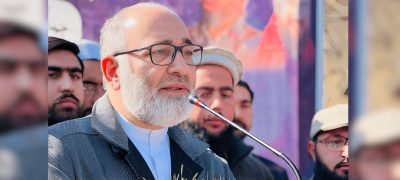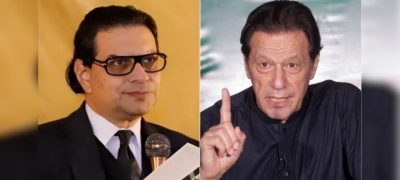The Pakistan Tehreek-e-Insaf (PTI) faced a significant setback as more than 230 former members of parliament decided to cut their affiliations with the party. This mass exodus, accounting for 42% of the party’s former influential political figures, has sent shockwaves through the already polarized political landscape, signaling a loss of confidence following the events of May 9.
The aftermath of the incidents on May 9 has not only reshaped the political dynamics but also laid the groundwork for a significant shift in alliances and loyalties, casting a shadow of uncertainty over the party’s future.
An investigation conducted by the Hum Investigation Team (HIT) revealed that these 230 former members, including those from the National Assembly and provincial assemblies, held considerable sway in their respective constituencies. Among them, a group of 65 ex-MPs remained ambiguous about their current association with the PTI.

Despite this exodus, a resilient faction of 183 former MPs reaffirmed their unwavering support for the PTI. When questioned about their loyalties, they staunchly declared, “We stand by the party and will contest upcoming elections,” showcasing enduring support even amid dissent.

The mystery surrounding the 65 undecided ex-MPs deepened as 50 of them, predominantly from Punjab, 10 from Khyber Pakhtunkhwa (KP), and five from Sindh, chose to keep their decisions undisclosed. This rupture in the party’s stronghold follows the PTI’s triumph in the 2018 general election with 478 seats, signifying a significant political shift.

Of the 65 members in limbo, a substantial portion hailed from Punjab, the political heartland, with additional contingents from KP and Sindh. This uncertainty posed a challenge to the PTI, given that its 371 directly elected MPs faced uncertainty about the allegiance of these members.

Further probing into the political landscape revealed the destinations of the departing former MPs. Among the defectors, 70 joined the Istehkam-e-Pakistan Party (IPP), 60 aligned with the Pakistan Muslim League-Nawaz (PML-N), and 40 pledged allegiance to the Pakistan Tehreek-e-Insaf Parliamentarian (PTI-P). Additionally, 25 and 10 found refuge in the folds of the Pakistan People’s Party (PPP) and Muttahida Qaumi Movement (MQM), respectively. The Awami National Party (ANP) and Jamiat Ulema-e-Islam-Fazl (JUI-F) each welcomed five estranged MPs during this turbulent period.

The investigation highlighted that 85 former MNAs bid farewell to the PTI, including 69 directly elected members, 11 women from reserved seats, and five from minority quotas. A significant departure was observed from Punjab, where 52 former MNAs left the party, alongside two from Islamabad, 15 from KP, and two from Balochistan, resulting in a void of 14 from Sindh.

Despite these departures, some pockets of loyalty remained. Notably, former Deputy Speaker of the National Assembly, Qasim Suri, remained steadfast with the PTI in Balochistan, while the federal capital witnessed a notable absence of party allegiance.

In the midst of this turmoil, seven former MNAs in Sindh held their ground, signaling a glimmer of hope. Additionally, 34 former MNAs unequivocally reaffirmed their allegiance to the PTI, showcasing resilience.

The provincial breakdown revealed significant shifts. In KP, 30 former MNAs remained anchored with the PTI, whereas from Balochistan, five out of seven former MPAs, including a woman on a reserved seat, chose to part ways with the party.

The unease extended to provincial assemblies, witnessing the departure of 14 out of 30 former MPAs, including women members, from the PTI. KP saw 38 out of 95 former MPAs leave, while Punjab retained the support of 93 members despite the loss of 86 former MPAs.

Notably, the PTI experienced an 80% loss of former MPs in South Punjab, a critical focal point in the nation’s political arena. The party, which previously dominated regions like Multan, Dera Gazi Khan, and Bahawalpur divisions in 2018, faced the departure of 22 former MNAs and 36 ex-MPAs from these crucial areas.










